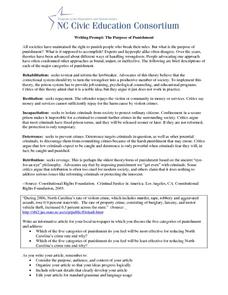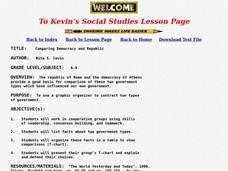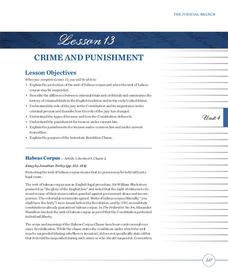School Improvement in Maryland
Political Systems: Advantages and Disadvantages
Every political system has advantages and disadvantages. To gain an understanding of these differences, groups investigate the political system of another country—oligarchy, monarchy, dictatorship, parliamentary—and prepare a...
Carolina K-12
Writing Prompt: The Purpose of Punishment
When punishment is given in a society when a member breaks its rules, what is it meant to accomplish? After summarizing the significant categories of punishment (rehabilitation, restitution, incapacitation, deterrence, and retribution),...
Utah State Courts
Judges in the Classroom
Class members explore the process of a disposition hearing for juveniles, particularly looking at how the judge decides what sentence the juvenile offender should receive. Task your pupils with evaluating different sample cases provided...
School Improvement in Maryland
Court Proceedings Civil Cases
What's the difference between civil and criminal law? How do the court proceedings differ in these two types of trials? How do the standards of proof differ? Why do these differences exist? As part of their examination of the US court...
Stanford University
Great Society
Students explore the Great Society. In this U.S. history and government lesson plan, students view the video "The Great Society," identify the major points of the speech, and compare and contrast the content with The New Deal.
Curated OER
"All Men Are Created Equal"
Students identify the premise of the United States' Democracy. They list the major elements of the document. Students reflect on the inequalities of the late 1700's premise of other units. They complete a KWL chart about the Declaration...
Curated OER
Comparing Democracy and Republic
Young scholarscomplete a graphic organizer comparing the republic of Rome and the democracy of Athens and realize that these two governments influenced US government.
Curated OER
Government and Community Resources
Students explore how to communicate using past tense and present perfect tense verbs. They discuss words related to postal activities and the procedures to follow when mailing letters and packages, registering mail, and buying money orders.
Curated OER
Family Forms and Family Life Cycle
There are so many different types of families, and each family functions in a different way. Discover the different roles, responsibilities, and relationships that develop in different family types. The lesson provides you with five...
Curated OER
Governmental Influence on the Construction of Dams
Students comprehend how the type of government system affects the country's ability to change the environment by construction of large projects like dams. They explain how the type of government a country has can determine the ability...
Curated OER
Marie Antoinette and the French Revolution
Students examine how the French and American revolutions influenced and emergence of free press in these countries. Students explore the link between government control of the press and the type of government. They compare and contrast...
Media Smarts
The Broadcast Project
As part of a unit on media studies, kids are asked to chart their viewing habits, observe the advertising that sponsors their favorite shows, and then to imagine what they would broadcast if given a block of airtime.
Curated OER
The Right to Vote
Students discover voting barriers. In this government instructional activity, students explore the history of voting. Students work in small groups to analyze and debate if certain groups of people should have the ability to vote or not.
Curated OER
The Art of Protesting
Students view various images to examine different types of protest Americans have used throughout history, and explore ways in which protest can produce change for better or worse.
Heritage Foundation
Crime and Punishment
You wouldn't give someone a 10-day timeout for eating a piece of candy. The US government, too, does not believe in unreasonable punishment. A variety of exercises exploring the clauses of the US Constitution prompts class members to...
Equality and Human Rights Commission
Discrimination
Discrimination takes many forms, and lesson eight in the 12-part series addresses many types and their greater impact on society. The lesson uses a presentation, videos, news stories, and discussions to synthesize many different viewpoints.
NOAA
Sustaining Our Ocean Resources
Lead young scientists on an investigation of fishery practices with the final installment of this four-part unit. Using a PowerPoint presentation and hands-on simulation, this activity engages children in learning how fish populations...
National Energy Education Development Project
Great Energy Debate
If someone yelled for eight years and eight months, they could produce enough energy to heat one cup of coffee. A lesson on energy encourages scholars to research 10 different energy sources in groups before playing a game. Twenty...
US Institute of Peace
Mediating Conflict
Two's a negotiation, but three's a mediation! Demonstrate the differences between the two processes through a role-playing lesson. The activity familiarizes pupils with the role of a mediator and examines the types of situations that...
California Academy of Science
Nuclear Energy: What's Your Reaction?
OSHA confirms that rules governing worker safety at nuclear power plants ranks higher than worker safety in offices. Scholars must consider safety, cost, alternatives, and other factors before recommending whether a town should build a...
Curated OER
Why a President? Why not a King?
Students research how and why a country elects to have an executive branch of the government. They study the office of the Presidency of the US.
Curated OER
Government Lesson Plan 16
Students identify different economic systems, compare economic systems by determining how the three basic economic questions are answered in each, and explain concept of mixed economies.
Curated OER
The Constitution: the Head of State
Students participate in a constitutional convention to debate whether Australia should become a republic. They form small groups to represent various sides of the debate such as parliamentary republicanism, popular republicanism and...
Curated OER
Declaration of Independence
Students define the words: republic, Articles of Condederation, survey, Northwest Ordinance, republicanism, ordinance, ratified, and Northwest Territory. They view the video Charlie Brown Constitution.
Other popular searches
- Compare Types of Governments
- 3 Types of Government
- Three Types of Government
- Five Types of Government
- Types of Government Diagram
- World Types of Government
- Government Types
- Government Types Lesson Plans
- World Government Types
- Types of Government Systems
- Different Types of Governments
- Greece Types of Governments

























